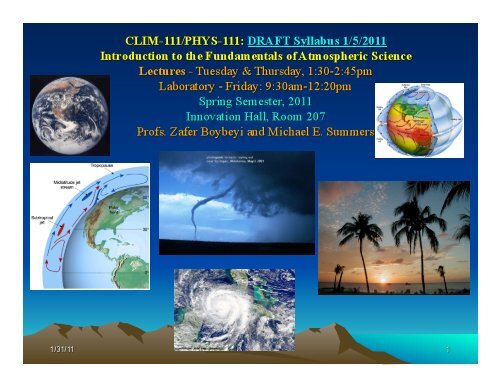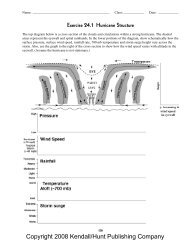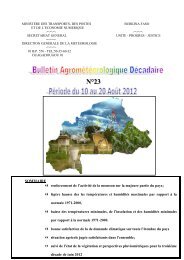pdf - CAMP - George Mason University
pdf - CAMP - George Mason University
pdf - CAMP - George Mason University
Create successful ePaper yourself
Turn your PDF publications into a flip-book with our unique Google optimized e-Paper software.
CLIM-111/PHYS-111<br />
Introduction to the Fundamentals of Atmospheric Science<br />
CLIM-112/PHYS-112 Lab<br />
An overview of the Earth’s atmosphere,<br />
its history, and the fundamental physical<br />
and chemical processes which determine<br />
its characteristics. The focus is on key<br />
concepts from thermodynamics,<br />
radiation, chemistry, and dynamics that<br />
are essential for understanding the state,<br />
variability, and long term evolution of<br />
the atmosphere, especially in the context<br />
of comparisons with other planetary<br />
atmospheres.
Prof. Michael E. Summers<br />
Science and Tech I, Room 303B<br />
Mail Stop 3F3<br />
Email: msummers@gmu.edu<br />
Phone: (703) 993-3971<br />
FAX: (703) 993-1980<br />
Prof. Zafer Boybeyi<br />
Research I, Room 217<br />
Mail Stop 6C3<br />
Email: zboybeyi@gmu.edu<br />
Phone: (703) 993-1560<br />
FAX: (703) 993-9229<br />
Course Website: Blackboard
CLIM-111/PHYS-111<br />
Introduction to the Fundamentals of Atmospheric Science<br />
Specific Course Goals:<br />
(1) an overview of the important physical and chemical processes which<br />
control the state, variability, and evolution of the Earth’s<br />
atmosphere in the context of what we have learned from<br />
exploration of other planetary atmospheres,<br />
(2) an understanding of the key scientific discoveries and remaining<br />
unanswered questions in atmospheric science,<br />
(3) an overview of the primary scientific principles and analytical tools<br />
used in atmospheric science studies, including both remote sensing<br />
and in-situ techniques, with special emphasis on model simulations<br />
to visualize the complex feedbacks involved in atmospheric<br />
processes, and<br />
(4) an understanding of the application of the scientific method to analyze<br />
and interpret observations of components of the atmospheric<br />
system.
CLIM-111/PHYS-111<br />
This combined lecture and lab course is designed with a dual-purpose:<br />
The first purpose is to provide a stand-alone course for students needing an<br />
introduction to scientific methods and critical reasoning as it relates to the<br />
environment. As such it will provide the necessary background information for<br />
understanding the many emerging societal problems that are consequences of<br />
human influences on the atmosphere.<br />
The second purpose is to provide an introductory course for those students that are<br />
beginning their degrees in atmospheric science or related scientific fields. For<br />
those students this course will provide a solid foundation for future more<br />
specialized courses in atmospheric science.<br />
The course is designed as the first course in the atmospheric science concentration<br />
but would be useful for any student wanting a one-semester overview of<br />
atmospheric science.
CLIM-112/PHYS-112 - Lab<br />
Introduction to the Fundamentals of Atmospheric Science<br />
The laboratory section is designed to enhance learning by<br />
applying the information acquired in the lecture portion of the<br />
course with practical applications covered in the student’s lab<br />
books.<br />
The student will engage in activities that are designed to expand<br />
and enrich the learning process through the use of state-of-the-art<br />
computer simulations that illustrate the complex phenomena that<br />
occur in the atmospheres of the Earth and other planets.
Course Outcomes: By the end of the semester this course student will<br />
have developed a basic understanding of the following:<br />
Characterization of temperature and it variation in the atmosphere.<br />
Solar influences and heating which drive atmospheric thermodynamics and<br />
motions<br />
Earth’s energy budget.<br />
Atmospheric moisture and the role of water in stability considerations.<br />
Cloud formation, precipitation and the range of cloud occurrences on other<br />
planets<br />
Atmospheric motions and the general circulation.<br />
The ability to read and interpret earth maps<br />
The climate system, variability, and climate controls.<br />
The properties and processes that control planetary habitability<br />
The atmospheric issues related to global change
CLIM-111/PHYS-111<br />
Introduction to the Fundamentals of Atmospheric Science<br />
FORMAT:<br />
Lecture Section (3 credits): There will be approximately one lecture<br />
topic covered per week. These lectures will include class discussion of<br />
topical issues.<br />
Selections from the Textbook of Lutgens, Tarbuck and Tasa, and its<br />
order of presentation, will provide the basic framework of the course and<br />
most of the qualitative discussions, while the John Frederick text will<br />
provide supplemental quantitative material.<br />
Laboratory Section (1 credit): The Laboratory Section will provide<br />
insight into atmospheric processes via web-based simulations that can be<br />
manipulated by the student. The Laboratory simulations are chosen to<br />
parallel the lecture topics and discussions.<br />
Classroom discussion is encouraged.<br />
There are no stupid questions!!
The Atmosphere: An Introduction<br />
to Meteorology, 11 th Edition<br />
(Required)<br />
Lutgens, Tarbuck, & Tasa (LTT)<br />
Prentice Hall, 2010<br />
ISBN 13-978-0-321-58733-6<br />
Principles of Atmospheric Science<br />
(For a more rigorous approach)<br />
John E. Frederick<br />
Jones and Bartlett (2008)<br />
ISBN 0763740896
Major content (Be sure to read everything!)<br />
Chapter Summary<br />
Vocabulary Review<br />
Review Questions (Excellent review for<br />
exams)<br />
Problems
www.mygeoscience.com<br />
Online review quizzes<br />
Critical thinking exercises<br />
Links to chapter-specific web resources<br />
Internet-wide key term searches<br />
GEODe: Atmosphere
CLIM-111/PHYS-111<br />
Introduction to the Fundamentals of Atmospheric Science<br />
Tentative Grading Policy:<br />
*Homework: 20%<br />
Two in-semester exams: 40%<br />
Final exam (comprehensive): 30%<br />
Participation: 10%<br />
*Homework mainly from end-of-chapter questions.<br />
You are responsible for all material from the texts, and any<br />
additional assigned readings.<br />
LAPTOPS are permitted in class for taking notes. But<br />
PLEASE don’t use laptops during class time for other<br />
activities such as web surfing and email.
CLIM-111/PHYS-111<br />
Introduction to the Fundamentals of Atmospheric Science<br />
Tentative Exam Dates:<br />
Two in-semester exams:<br />
Exam 1 – Thursday, March 3<br />
Exam 2 – Thursday, April 14<br />
Final Exam: Comprehensive<br />
TBD
Lutgens, Tarbuck & Tasa: Tentative Schedule<br />
Lecture numbers correspond to chapters in Lutgens & Tarbuck:<br />
Week 1 – January 24: Introduction to the Atmosphere (S)<br />
Week 2 - January 31: Heating Earth’s Surface and Atmosphere (B)<br />
Week 3 – February 7: Temperature (B)<br />
Week 4 – February 14: Moisture and Atmospheric Stability (S)<br />
Week 5 – February 21: Forms of Condensation and Precipitation (S)<br />
Week 6 – February 28: Air Pressure and Winds (B), Exam 1<br />
Week 7 – March 7: Circulation of the Atmosphere (B)<br />
March 14 – Spring Break<br />
Week 8 – March 21: Air Masses (B)<br />
Week 9 – March 28: Weather Patterns (B)<br />
Week 10 –April 4: Thunderstorms and Tornadoes (S)<br />
Week 11 – April 11: Hurricanes (S), Exam 2<br />
Week 12 – April 18: Weather Analysis and Forecasting (B)<br />
Week 13 – April 25: Air Pollution (S)<br />
Week 14 – May 2: The Changing Climate (S)
Chapter 1: Chemical Composition and Structure (8/26)<br />
Parallel reading with LT chapter 1<br />
Chapter 2: Solar and Terrestrial Radiation: Atmospheric Energy Balance (9/2)<br />
Parallel reading with LT chapters 2 and 3<br />
Chapter 3: Atmospheric Water (9/16)<br />
Parallel reading with LT chapters 4 and 5<br />
Chapter 4: Winds – The Global Circulation and Weather Systems (9/30)<br />
Parallel reading with LT chapters 6, 7, 8, 9, 10, 11, 12<br />
Chapter 5: Chemical Processes and Atmospheric Ozone (11/25)<br />
Parallel reading with LT chapter 13<br />
Chapter 6: The Earth’s Climate (12/2)<br />
Parallel reading with LT chapter 14
Basic and Introductory:<br />
Clouds in a Glass of Beer: Simple Experiments in Atmospheric Physics,<br />
Craig F. Bohren, Dover Publications, 2001.<br />
What Light Through Yonder Window Breaks: More Experiments in<br />
Atmospheric Physics, Craig F. Bohren, Dover Publications, 2006.<br />
The Atmosphere: An Introduction to Meteorology, Frederick K. Lutgens, Edward<br />
J. Tarbuck, and Dennis Tasa, Prentice-Hall, 2006.<br />
More Advanced:<br />
An Introduction to Atmospheric Physics, David G. Andrews, Cambridge<br />
<strong>University</strong> Press, 2000.<br />
An Introduction to Dynamic Meteorology, J.R. Holton, 4 th Edition, International<br />
Geophysics Series, 2004.<br />
Basic Physical Chemistry for the Atmospheric Sciences, Cambridge <strong>University</strong><br />
Press, 2000.
American Meteorological Society:<br />
http://www.ametsoc.org/<br />
National Aeronautics and Space Administration:<br />
http://www.nasa.gov<br />
National Oceanic and Atmospheric Administration:<br />
http://www.noaa.gov/<br />
The Weather Channel:<br />
http://www.weather.com/<br />
The NASA Astrobiology Institute:<br />
http://nai.nasa.gov/
GMU is an Honor Code university; please see the <strong>University</strong> Catalog for a<br />
full description of the code and the honor committee process. The principle<br />
of academic integrity is taken very seriously and violations are treated<br />
gravely.<br />
What does academic integrity mean in this course? Essentially this: when<br />
you are responsible for a task, you will perform that task. When you rely on<br />
someone else’s work in an aspect of the performance of that task, you will<br />
give full credit in the proper, accepted form.<br />
Another aspect of academic integrity is the free play of ideas. Vigorous<br />
discussion and debate are encouraged in this course, with the firm<br />
expectation that all aspects of the class will be conducted with civility and<br />
respect for differing ideas, perspectives, and traditions. When in doubt (of<br />
any kind) please ask for guidance and clarification.
Honor Code To promote a stronger sense of<br />
mutual responsibility, respect, trust, and fairness<br />
among all members of the <strong>George</strong> <strong>Mason</strong><br />
<strong>University</strong> community and with the desire for<br />
greater academic and personal achievement,<br />
we, the student members of the <strong>University</strong><br />
Community have set forth this Honor Code<br />
Student members of the <strong>George</strong> <strong>Mason</strong><br />
<strong>University</strong> community pledge not to cheat,<br />
plagiarize, steal, or lie in matters related to<br />
academic work.<br />
http://www.gmu.edu/departments/unilife/pages/honorcode.html
February 8 – Enrollment Deadline. This is the<br />
last day to add into a course. Students may not<br />
register into any section after this date. No<br />
exceptions. This is also the last day to drop a<br />
course without losing tuition money.<br />
February 25 – Drop Deadline. This is the last<br />
day a student may drop a course. After this<br />
date, students may withdraw from a course, but<br />
only according to strict guidelines.
If you are a student with a disability and you need<br />
academic accommodations, please see me and<br />
contact the Office of Disability Resources at<br />
703/993-2474.<br />
All academic accommodations must be arranged<br />
through that office.
WRITING CENTER: A114 Robinson Hall; (703) 993-1200;<br />
http://writingcenter.gmu.edu<br />
UNIVERSITY LIBRARIES “Ask a Librarian”<br />
http://library.gmu.edu/mudge/IM/IMRef.html<br />
COUNSELING AND PSYCHOLOGICAL SERVICES (CAPS):<br />
(703) 993-2380;<br />
http://caps.gmu.edu<br />
The <strong>University</strong> Catalog,<br />
http://catalog.gmu.edu<br />
is the central resource for university policies affecting student,<br />
faculty, and staff conduct in university affairs.
Prof. Zafer Boybeyi<br />
Office Hours<br />
Wednesday:<br />
Additional hours by appointment<br />
Spring 2010: Tentative Travel
Read: Lutgens & Tarbuck (LT) Chapters 1 & 2<br />
Chapter 1 Review Questions: 1, 2, 3, 4 (Essay type<br />
questions)<br />
Read Frederick, Chapter 1<br />
Chapter 1 Problems: 1, 2, 3, 4, 5, 6 (Quantitative<br />
problems)<br />
Homework Due: February 8<br />
Read: D. Bodanis article “It’s in the air…”







